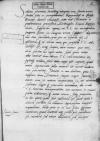Mitto Tuae Celsitudini in praesentiarum promissum Ecclesiasten ⌊Erasmi Roterodami⌋, suppliciter rogans, ut Tua Celsitudo hoc munusculum pauperis clientis sui benigno animo suscipere dignetur, non tam pecuniola, quae pro eo exposita est, id aestimans, quam ex animo meo, qui profecto Tuae Celsitudini addictissimus est eritque semper, „cf. Verg. A. IV 336 ⌊dum memor ipse mei, dum spiritus hos reget artuscf. Verg. A. IV 336 ⌋.” Sed spero etiam alio nomine hunc librum Tuae Celsitudini commendatum iri, posteaquam tandem, proh dolor! Verum esse coeperit, quod antea saepenumero falso rumore de morte auctoris eius percrebuit. Tametsi enim non dubitem, quin Tua Celsitudo magnum hunc ⌊Erasmum⌋ semper magni fecerit, tamen cum sic natura comparatum sit, ut virtutem sublatam magis quam praesentem admiremur, omnino credo Tuam Celsitudinem hominem incomparabilem iam mortuum in maiori pretio habiturum, quam antea vivum. Idque praesertim in hoc opere, quod fere postremum est, quod nobis e divino pectoris sui thesauro depromptum benigne impertivit. Unde puto in eo non solum cygneam cantionem, quod oratoribus atque poetis circa senectam fere peculiare est, resonare, sed etiam diviniora, pro suscepti
argumenti ratione, nobis in eo tradi, quam in superioribus huius rari organi Dei voluminibus. Si quidem quo propius pii doctores morti accedunt, morti autem, immo traiectui ex his mundi saevis periculis in perpetuae tranquillitatis portum, eo magis Deus in eis agit, suaque caelestia oracula per ipsos uberius nobis effundit. Sed quid ego homuncio haec apud Tuam Celsitudinem? Plane id, quod aiunt,
cf. Adagia 1,2,11 Ululas Athenas ⌊noctuas ⌊Athenas⌋cf. Adagia 1,2,11 Ululas Athenas ⌋. Verum Tua Celsitudo id clementer condonare dignabitur singulari meae fiduciae, quam de istius inclyta humanitate animo concepi. Nam nisi mihi ea cum ex aliorum sermone, tum ex Tuae Celsitudinis clementi colloquio cognita perspectaque esset, nescio an auderem huiusmodi exigua munuscula ad istam mittere, nedum inanium verborum turba eidem obstrepere. Porro cum Ioannes bibliopola alios libros ex ⌊Lypsia⌋ acceperit, seligam inde optimos quosque, qui Tuae Celsitudini non indigni videbuntur, eosque ⌊Matthaeo Platten⌋ Tuae Celsitudini transmittendos dabo. Nam si Tuae Celsitudini in re longe maiori obsequi aut inservire potero, facturus sum id quam promptissimo animo, quatenus id tenuitas mea patietur. His me Tuae Celsitudini humiliter commendatum velim, istam vero Deo Optimo Maximo quam diutissime atque felicissime incolumem conservandam.


